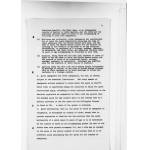US Immigration Laws Submitted to Evian Conference
7/8/1938
Add to Favorites:
Add all page(s) of this document to activity:

Add only page 1 to activity:
Add only page 2 to activity:
Add only page 3 to activity:
Add only page 4 to activity:
Add only page 5 to activity:
Add only page 6 to activity:
Add only page 7 to activity:
Add only page 8 to activity:
Add only page 9 to activity:
Following the German Anchluss with Austria, President Franklin Roosevelt proposed an international conference to facilitate and finance “political refugee” emigration to other countries. Delegates from thirty-two countries met in Evian, France in July 1938. Roosevelt appointed Myron C.Taylor, a moderate Republican businessman, to represent the United States.
At the conference, Taylor announced that the U.S. would admit its full German/Austrian quota of 27,370 per year over the next five years—a number set by the Immigration Quota Act of 1924. This was far lower than the 300,000 applicants on waiting lists for U.S. visas. The conference also established a new Intergovernmental Committee on Refugees to negotiate with Germany on refugee matters.
Ultimately, though, the Evian Conference was a failure because no country—including the United States—was willing to take in the large enough numbers of European Jews seeking safe haven.
At the conference, Taylor announced that the U.S. would admit its full German/Austrian quota of 27,370 per year over the next five years—a number set by the Immigration Quota Act of 1924. This was far lower than the 300,000 applicants on waiting lists for U.S. visas. The conference also established a new Intergovernmental Committee on Refugees to negotiate with Germany on refugee matters.
Ultimately, though, the Evian Conference was a failure because no country—including the United States—was willing to take in the large enough numbers of European Jews seeking safe haven.
This primary source comes from the Collection FDR-Taylor: Myron C. Taylor Papers.
Full Citation: Statement of the Immigration Laws and Practices of the United States from the Evian Intergovernmental Committee Conference ; 7/8/1938; Collection FDR-Taylor: Myron C. Taylor Papers; Franklin D. Roosevelt Library, Hyde Park, NY. [Online Version, https://www.docsteach.org/documents/document/us-immigration-laws-submitted-to-evian-conference, May 9, 2024]Rights: Public Domain, Free of Known Copyright Restrictions. Learn more on our privacy and legal page.









